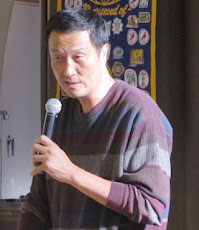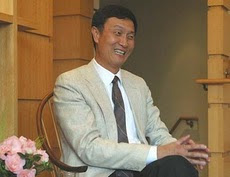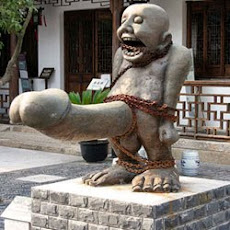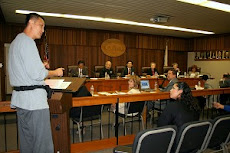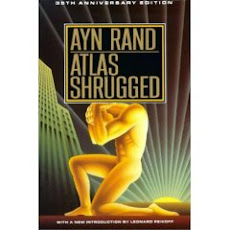

“被国培养","为国争光"是奴役制体育的精髓 Slave Athletes Serving Master
每日一语:
奴役制体育的精髓是抹杀体育家个体的兴趣,天才,努力与尊严。 在今天的中国,道德的、纯粹的体育精神与竞技被奴役政治与腐败文化彻底地污染。 体育家的自尊与个体爱好荡然无存。 每一个运动员也要承担他吸食体育精神毒品而对自身造成伤害的个体责任。 --- 陈凯
Slave athletic culture in China is centered around one thing -- completely denying/destroying each/every athlete's personal interests, talent, effort and self-respect/dignity. Today, China's sports and athletics have been thoroughly corrupted by the slave culture and politics. The cancer has already spread to every cell of Chinese society. Each individual athlete should also bear the responsibility of buying into such a slave culture and addicting to such cultural narcotics. --- Kai Chen
-----------------------------------------------------------
Dear Visitors:
I watched HBO sports special "Real Sports" by Bryant Gumbel last night. Chinese sports machine by the government and the state of the Chinese athletes is one of the topics.
When Mr. Gumbel interviewed the former Chinese woman weightlifter in Shenyang whose husband (another Chinese weightlifter) died at age 33, she could not even tell the truth to the reporter for fear of repression from the Chinese authority. Fear permeates everything in China, even after one is harmed, he/she is still controlled by such a emotion. What a pity!
This former woman athlete only signed with resignation: "What is the use? My husband is already gone." From this expression you can sense what is on a Chinese person's mind is never any of the values (truth, justice, liberty and dignity). It is all about physical survival. No wonder the Chinese National Anthem only regards human beings as "Flesh and Blood". Each human life in China is nothing but just another physical existence consisted of nothing but cells and chemicals. "Meaning" is an alien concept in a slave culture.
The Chinese people/athletes' mindset has been heavily penetrated by the cultural narcotics produced the Chinese despotic authority. They constantly need and demand more potent "designer narcotics" in order to numb their senses and mind, in order to forget the painful past, in order to survive physically.... So the Chinese regime constantly provides such narcotics, knowing that satisfying the need of the addicts is more important to the regime's own survival. Such is the truth and reality in China today.
I now paste the following article from the Times Magazine. In this article some Chinese persons with the drugged mindset claim that today China's athletes' plight is due to the economic development. What a perverted view! I know personally such plight has never been changed and the conditions of the athletes have never been improved. They are only the toilet paper (or some chewed up gums) to be abandoned after they are used up. Nothing else.
I remember some days ago some "angry youths" came to me and accused me of betraying China. "China reared you and now you turn against her. You are a traitor." They claimed. I often wonder whether they knew anything at all about what they were saying. Who/what the fuck is China??!! How can China raise me or rear me??!! Only God created me with athletic talent and China only hijacked my love and talent to oppress me and legitimize itself. China only held my love for basketball and my family/friends as hostages against me. China has committed countless unspeakable crimes against me and many like me. Not only will I not thank China, I will do everything in my power to expose China's evil and crimes against humanity, against individuals like me. I will do everything in my power to vanquish China/Chinese regime. I do indeed have that moral obligation and I intend to fulfill that obligation. I owe nothing to China. I owe everything to myself and God, period.
I will stop here for you to read the below article.
Best. Kai Chen 陈凯
-------------------------------------------------------
China's Disposable Athletes
Tuesday, Jul. 17, 2007 By JODI XU/BEIJING
When Zou Chunlan left school to become a professional athlete, her recruiting coach assured the 13-year-old that the nation's huge sports bureaucracy would look after her for the rest of her life. All she had to worry about was winning. For a decade, Zou followed his advice, winning the 48-kg national weightlifting title in 1990 when she was 19 years old and pocketing four other national championships. But when she retired in 1993, Zou discovered that the coach's side of the bargain wasn't going to be met. After three years of menial jobs in the women's weightlifting team's kitchen, she was asked to leave.
With her little education and total ignorance of the real world, Zou had little choice but to turn to physical labor. After stints carrying sacks on a construction site and selling lamb kebabs in the street, she ended up as a masseuse in a public bathhouse earning $60 a month. Her fate isn't unusual. A weightlifting coach explained to the Beijing News that Zou wasn't the only retired weightlifter struggling with the real world. "Zou's national medals are worthless. There are world champions who end up jobless after retirement."
The system that is so good at churning out Olympic medalists seems to be even better at producing poverty-stricken retired athletes. Last year, China's national news agency Xinhua reported that almost half of 6,000 professional athletes retiring from competition each year end up jobless or without further schooling plans. Among them, the winner of the 1999 Beijing International Marathon Ai Dongmei, 26, who announced last year that she had no choice but to sell off her medals so that she could feed her family. Former Asian weightlifting champion Cai Li died of pneumonia at age 33 after he couldn't afford to pay his medical bills. Liu Fei, a seven-time national champion and world champion in acrobatic gymnastics, struggles to live on the $20 she earned monthly from tutoring gymnastics.
According to the China Sports Daily, nearly 80% of China's 300,000 retired athletes are struggling with joblessness, injury or poverty. Many athletes suffer from sports injuries and health problems caused by their training. Zou came out of the system with her own appalling legacy. She says the pills she was required to take made her grow a beard and develop a prominent Adam's apple and a deep voice. "My coach told me it was a nutrition booster. I trusted him," Zou says. The steroids also made her infertile. Now, she must shave every couple of days.
The root of Zou's troubles, like so many things in China today, can be traced back to the country's wholesale adoption of capitalism. Market forces were unleashed on what was once a sports system that cared for its athletes from cradle to grave, leaving Zou and tens of thousands of others out in the cold when they had passed their athletic peak and could no longer win attention and profits for their sports associations. In 2003, the changes were reinforced by a new law that shifted most responsibility for employment after retirement to the athletes themselves. "This group of athletes is the legacy of China's economic development," Liu Mingyu, deputy director of Liaoning Provincial Sports Bureau told the Beijing News. "I feel for them, but there is nothing we can do to help all of them." The 2003 law stipulates that "a lump sum compensation is to be given to those athletes who choose to find jobs on their own." But that amount is usually not big enough to help an athlete with injuries and without an education.
Athletes now in training, however, may benefit from a new regulation currently being considered in the country's sports bureau. It would bar recruitment of professional athletes until after they graduate high school. Some joint programs between sports teams and university departments have also been under discussion so that athletes are able to attend classes in university during training.
Since her plight became public, things have taken a turn for the better for Zou. With the help of the All China Women's Federation, she opened a laundry shop six months ago in her hometown, Changchun, capital of Jilin Province. She no longer has to work as a masseuse at a bath house. But she is still struggling. Unable to read and unfamiliar with computers, she says she can hardly manage to add up her accounts. "I gave my youth to sport," she told TIME over the phone, in a voice thick with emotion, "but in return, I was thrown out like garbage with no knowledge, no skill and a barren womb."





















































